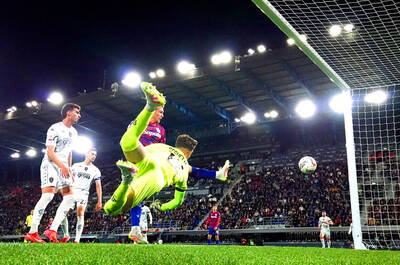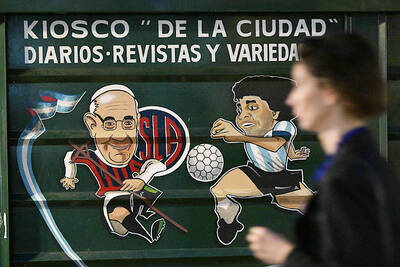Russia is considering how to simplify visa rules for more than 40,000 English soccer fans who hope to travel to Moscow for the Champions League final.
The Foreign Ministry has already decided to cut some red tape and all that remains is to decide what documents the supporters need to submit to get the tourist visas.
“In principle, the decision to simplify the process is there. How this will be done is another question,” said a ministry official, who spoke on condition of anonymity because he is not authorized to speak to the media.
The official said fans may have to wait until next week to find out because yesterday and today are public holidays in Russia.
An all-English final on May 21 was guaranteed after Manchester United beat FC Barcelona 1-0 in the second-leg of the semi-finals after a goalless draw in Spain.
UEFA said on Wednesday that one rule set to be relaxed is a requirement that all visitors to Russia provide details of a hotel room booking.
“We have urged the Russian authorities to come up with a simplified visa procedure,” UEFA spokesman William Gaillard said in Switzerland. “This has been done by contacts between our president [Michel Platini] and the top level of the Russian government hierarchy. We have encountered a lot of goodwill on the Russian side. They are trying to put together a package that is attractive to supporters.”
Russian officials in London sought to calm any lingering nerves.
“We would like to assure all fans wishing to support their club in Moscow that, despite the extremely tight time frame, all visa applications will be considered promptly,” the Russian embassy in London said in a statement on Wednesday.
Anton Borysenko, a spokesman for the Russian National Tourist Office — which the Russian embassy in London has charged with dealing with visas for the supporters — said: “We are 100 percent sure that all fans will get their visas.”
The office will process visas for the finalists’ official supporters clubs and has already issued tourist visas to individual fans, Borysenko said.
Supporters of the two finalists will get 47,000 tickets to the Luznhiki Stadium match, presenting a nightmare of logistics for visas, accommodation and security.
The visa issue has not been helped by frosty relations between London and Moscow.
“We are convinced that football lovers from both countries would have only benefited had the United Kingdom government not decided in July 2007 to suspend negotiations with Russia on a bilateral agreement easing visa regulations and toughen the approach toward Russian citizens applying for British visas,” the embassy said. “Many problems could have been avoided if Russia and the United Kingdom had an agreement similar to that existing between our country and the European Union.”
Many Manchester United fans are worried about the stringent visa requirements.
Geoff Pearson, who runs an MBA course in soccer at Liverpool University, fears that sending off his passport to the Russian authorities would prevent him from lecturing abroad before the final.
“It could be disastrous for me,” said Pearson, who will take four different airlines to reach Moscow. “This will be the most problematic final for fans because of the visa situation and Moscow being incredibly expensive to get to and to get accommodation there.”
Some fans are not going to Moscow because of the hassles.
Duncan Drasdo, chairman of the Manchester United Supporters Trust, attended the 1999 final in Barcelona, but said he would not make the trip to the Russian capital with his two young sons.
“For this final there will be a lot fewer fans traveling this time without tickets because of the potential difficulties of being in Moscow,” he said. “There are difficulties obtaining visas and so much uncertainty associated with that, as well as hotel accommodation being pretty limited.”
Meanwhile, Moscow police shrugged off the potential threat of violent clashes between fans.
Yevgeny Gildeyev, a spokesman for Moscow city police, said months of planning had prepared authorities for the invasion of fans and the fact that they will represent fierce English rivals would not make policing more difficult.
“We have a coordinated plan of action. From the moment they arrive, fans of each team will have police escorts and will be kept apart. I don’t see how they will have the chance to clash,” Gildeyev said. “We have also had a high level of co-operation with the clubs. English clubs are very professional when it comes to security matters.”
Russian officials had already visited Britain to discuss security matters with club representatives, Gildeyev said.
UEFA once more ruled out any suggestion of moving the game from Moscow, pointing to an all-Spanish final between Real Madrid and Valencia played in Paris in 2000 and an Italian final between AC Milan and Juventus at Manchester United’s Old Trafford in 2003.

Bologna on Thursday advanced past Empoli to reach their first Coppa Italia final in more than half a century. Thijs Dallinga’s 87th-minute header earned Bologna a 2-1 win and his side advanced 5-1 on aggregate. Giovanni Fabbian opened the scoring for Bologna with a header seven minutes in. Then Viktor Kovalenko equalized for Empoli in the 30th minute by turning in a rebound to finish off a counterattack. Bologna won the first leg 3-0. In the May 14 final in Rome, Bologna are to face AC Milan, who eliminated city rivals Inter 4-1 on aggregate following a 3-0 win on Wednesday. Bologna last reached the

If the Wild finally break through and win their first playoff series in a decade, Minnesota’s top line likely will be the reason. They were all over the Golden Knights through the first two games of their NHL Western Conference quarter-finals series, which was 1-1 going back to Minnesota for Game 3 today. The Wild tied the series with a 5-2 win on Tuesday. Matt Boldy had three goals and an assist in the first two games, while Kirill Kaprizov produced two goals and three assists. Joel Eriksson Ek, who centers the line, has yet to get on the scoresheet. “I think the biggest

From a commemorative jersey to a stadium in his name, Argentine soccer organizers are planning a slew of tributes to their late “Captain” Pope Francis, eulogized as the ultimate team player. Tributes to the Argentine pontiff, a lifelong lover of the game, who died on Monday at the age of 88, have been peppered with soccer metaphors in his homeland. “Francisco. What a player,” the Argentine Football Federation (AFA) said, describing the first pope from Latin America and the southern hemisphere as a generational talent who “never hogged the ball” and who showed the world “the importance of having an Argentine captain,

Noelvi Marte on Sunday had seven RBIs and hit his first career grand slam with a drive off infielder Jorge Mateo, while Austin Wynn had a career-high six RBIs as the Cincinnati Reds scored their most runs in 26 years in a 24-2 rout of the Baltimore Orioles. Marte finished with five hits, including his eighth-inning homer off Mateo. Wynn hit a three-run homer in the ninth off catcher Gary Sanchez. Cincinnati scored its most runs since a 24-12 win against the Colorado Rockies on May 19, 1999, and finished with 25 hits. Baltimore allowed its most runs since a 30-3 loss to